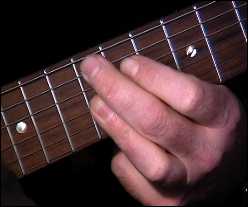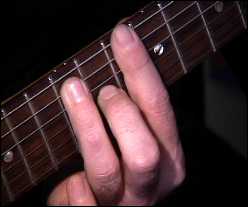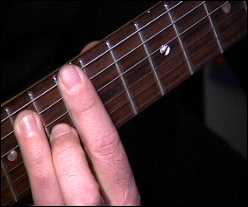Scroll through the lesson and click on notation/video/audio links to load the interactive players.
Please subscribe to get full access to all lessons for only $7.95/month PLUS 1 week free trial.

Riff Interactive lessons are
LESS expensive and
MORE interactive than alternatives!
More Info
|
|
| Lesson Subject:
Blues Legends I |
| What you learn:
Buddy Guy Style |
| Teacher: Michael Johnson |
Michael:
Our interactive lesson covers the style of Buddy Guy.
Buddy Guy, along with Otis Rush and Magic Sam helped to influence the evolution
of blues during the
postwar era. Jimi
Hendrix has been quoted as being profoundly influenced by Buddy Guy, in addition
to players like Eric
Clapton have called him the greatest blues guitarist ever! Here's a sample of
some of the licks you'll learn:
Click Here for Lesson Sample Video
Teacher: Buddy's style is more lyrical compared to
a player like Albert King. Buddy often combines the Major and Minor pentatonic scales
to create his lyrical style.
Here's our jam track:
Michael: You will be using the key of A.
The jam track has bass and drums only. You will be using the A9 (I), D7 (IV), E7 (V),
to play over this track.
Michael: Practice these chords over the jam track
and notice how I play with a staccato attack. Here are some pictures of the fingerings:
A9 (5th string/12th fret)

D7 (6th string/10th fret)

E7 (6th string/12th fret)

Michael: There is a C# in the A9.
JoeK:
good, I only know the A9 at the 12th fret
Michael:
OK, now try playing the rhythm over a jam track with the guitar added.
Teacher: Here's the first lick you can play over the jam track:
Lick 1
johnny: Question teach. Are those chords minor 7 and 9?
Michael: Johnny, they are based on major, but the are dominate 7th and 9th chords.
This lick starts by using the A Major Pentatonic and A Minor Pentatonic scales.
The "major pentatonic" scale has a unique country rock type sound, kind of like the Allman Bros.
and southern rock bands like that:
Michael: For this next lick notice I
start playing in the A Major Pentatonic pattern (14th fret) on the IV (D7) of
the progression and then jump back the A Minor Pentatonic pattern (5th fret) when the
progression returns to the I (A). Notice towards the end of the lick you "trill" using the
Maj 3rd of the scale. Let's move to the next lick:
Lick 2
Teacher: The next lick uses more of the A
Minor Pentatonic scale. This has a pretty cool run using the scale pattern. Try
to play the 2nd and 3rd licks together.
Lick 3
Steve: It all stays in the same area.
Michael: Steve,
it sure does. Now try the two licks together, notice how all off these parts start blending.
It makes your solos sound more fluid. Let's try another lick:
Lick 4
JoeK:
Teach, do you barre the 5th fret or (my guess) move your 1st and 3rd fingers around as necessary to play lick 3?
Michael: Yes Joe. Now this lick uses the 5th fret
of the A Min Pentatonic scale, and then moves into the next Minor Pentatonic box pattern using a slide:
Michael: The last tab shows the 1st position and 2nd position
of the A Minor Pentatonic scale box patterns together. See how they consist of the same notes, only different positions.
You can jump between the patterns easily.
The next lick uses the A Major Pentatonic scale again, only different position. This scale has
kind of a BB King sound to it.
Lick 5
Michael: See how all these patterns blend.
It gives you so many options to play. Let's add more to this lick:
Lick 6
Michael: This lick uses the A Major Pentatonic
scale and then jumps to the A Minor Pentatonic. Here's what the two patterns look like:
Michael: See how they overlap? There is a lot of potential for licks using just those two patterns together,
they share a few notes like E and A
JoeK: Should you limit the use of the major pentatonic notes to keep a bluesy feel? or move freely between patterns?
Teacher:
Joe, you would be surprised how much BB King actually plays using the Major Pentatonic scales,
it's signature to his style of blues.
JoeK:
How about Buddy Guy?
Michael:
Pretty much the same answer for Buddy's style. Now this next lick starts on the A
Minor Pentatonic (2nd box pattern), then Major Pentatonic, and then A Minor Pentatonic (1st
box pattern). This example mostly uses the Minor Pentatonic:
Lick 7
Michael: This lick has a nice feel and flows well, any trouble playing this lick?
johnny: Question...in the blues progression, does it matter when you play the minor pentatonic versus major pent?
Michael: Johnny, why don't you try playing everything in the
Minor Pentatonic the first time and then playing the Major Pentatonic the second time
through the progression to get a feel for each scale. Then try mixing the
patterns up, you'll be surprised on the combinations you can come up with.
JoeK:
From what you are showing tonight, it looks like, in Blues, you can mix add individual major pent. notes to a lick AND you can add whole major pent licks that tie into the minor stuff. Is that right?
Steve: It just give it a different 'color'
Michael: Exactly, that way you can hear the contrasts in sounds you can create, you might like one over the other, or combine them like we did tonight.
See you all next lesson!
|
<< load notation from left
|
|
<< load audio from left
|
<< load audio from left
|